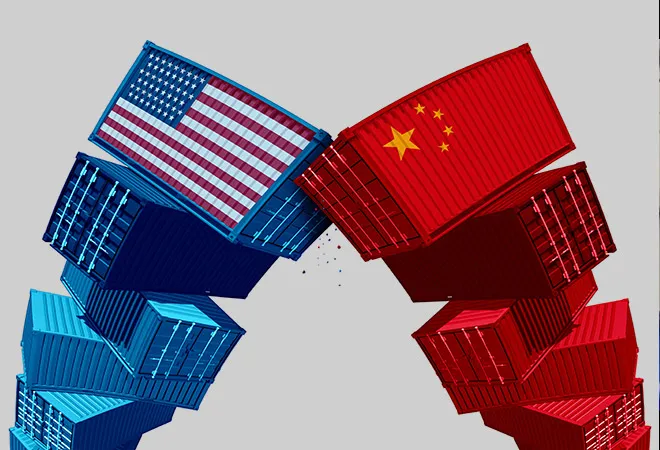There is an element of lazy thinking when people describe the situation between the US and China as a new Cold War, thus connecting it with the binary competition between the erstwhile Soviet Union and the United States in the 1950s-1980s.
The US-China relations have been rocky since 2018 when the two sides began a tariff war and the US began to restrict the export of semiconductors to China. And then came Covid-19 and as the situation in the US deteriorated, the level of rhetoric against China began to rise. It has been primarily opportunistic, driven by the hope that attacking China could perhaps make the US electorate overlook the shoddy handling of the pandemic by the Trump administration. After all, consider that at the beginning of this year, the US and China had agreed to a Phase I trade deal which would have made them even bigger trade partners than they are.
But now, as the election approaches, it has become wholly political with a group of anti-China hawks led by Secretary of State Mike Pompeo launching a scorched earth policy that will ensure that a Biden presidency is not easily able to alter its trajectory.
This is a moment of great opportunity and risk for India. One of the important features of the current situation is a desire of the US to break some key technology links with China. Steps have already been taken in this direction and we can anticipate some more in the coming months.
Corporations and businesses are scrambling to anticipate the situation and are looking for alternatives. By virtue of its size and political orientation, India fits the bill. Political proximity to the United States is a plus. But the task of creating the physical and human infrastructure to receive this bounty is entirely ours and there are no signs that we understand this.
But there is risk as well. China is a powerful neighbour, belligerent of late, with whom we share a vast land border. In addition, China’s economic and growing maritime power makes it a player in our own South Asian and Indian Ocean region backyard. In that sense, in this ‘new’ Cold War, India is a frontline state and all the dangers that come with that status.
We need to carefully understand what this could entail. For example, while the US will encourage India to play a more active role in the South Africa-Indian Ocean Rim (SA-IOR) region, as well as in the western Pacific, it may not want to get involved in India’s Himalayan quarrels. Through an October 27, 1962 statement, the US recognised the McMahon Line as the international border, but it still views Jammu and Kashmir and Ladakh as disputed areas. Whether the US would want to get militarily involved in any Ladakh situation is a moot issue.
Historical analogies are a useful device to understand a situation, but they are not exact. So, while the ‘new Cold War’ is a useful device to understand the situation, we also need to be clear in our own minds that it’s not quite a repeat of that past.
For one, it is not an ideological contest. We have capitalist America taking on a form of state capitalism in China. Neither is there military alliances arrayed against each other on a global scale. China hosts a great number of American industries, it owns a substantial portion of its debt, and in turn, the US hosts hundreds of thousands of Chinese students.
In terms of military power, the US is way ahead of China which does not have the kind of alliance system the US has. China does have substantial military capability, one which is growing, but it is essentially one that has application on its borders only. So yes, militarily, we need to be careful of China’s teeth along the Himalayan frontier and western Pacific, but that’s about it. And let’s be clear about one thing, communist or capitalist, authoritarian or democratic, China would behave in the same way. Like any power, it would be driven by its perception of national interests, not ideology. Pompeo’s claim that the struggle is between the free world and ‘new tyranny’ can hardly resonate in places like Brazil and India where the notion of liberties is increasingly narrowing.
We are actually in an entirely new era, where the old rules and blocs that governed the world order have gone. They were already coming apart before Covid, the process has now accelerated.
For the sake of peace and stability, which everyone needs, we need to reconstitute it. Whether it is arms control, confidence building measures (CBMs), security treaties, trading regimes, they have all frayed. Also, the country that played an out-sized role in creating and sustaining them has signalled that it is no longer interested in assuming the burden of hegemony.
The challenge is, therefore, to come up with a successor world order with new rules of the game. Experience tells us that they will not be simply multilateral regimes, there is room now for plurilateral alliances aimed at providing both security and economic benefits. And yes, Covid has taught us that we need to build in redundancy into the system so that it doesn't come apart the way it nearly did in February this year.
In this process, one set of problems and solutions may require one kind of a coalition, another set an entirely different one. Pompeo’s Manichaean struggle has no place in a world that needs more, rather than less, cooperation and collaboration. This was, if you recall, the very first lesson of the old Cold War.
This commentary originally appeared in Tribune India.
The views expressed above belong to the author(s). ORF research and analyses now available on Telegram! Click here to access our curated content — blogs, longforms and interviews.




 PREV
PREV


